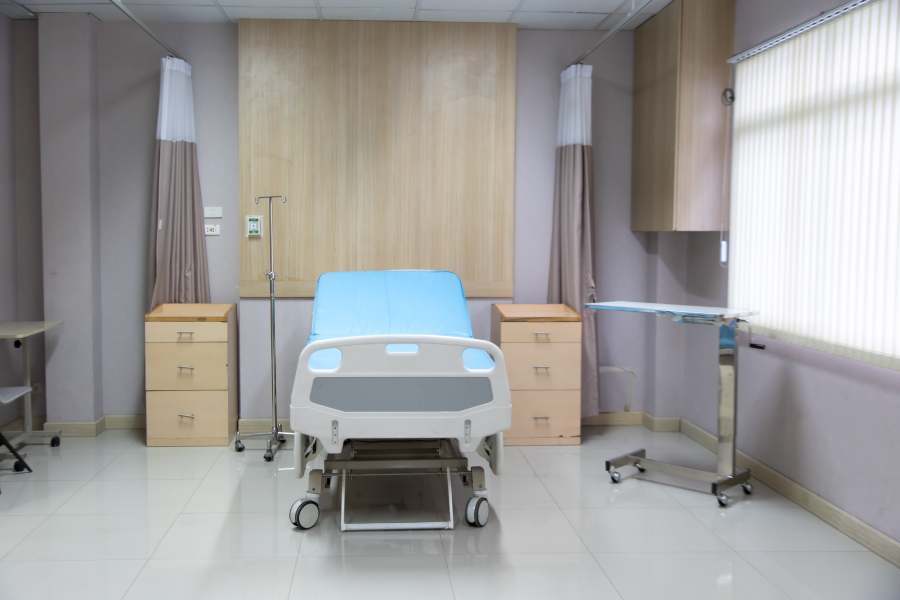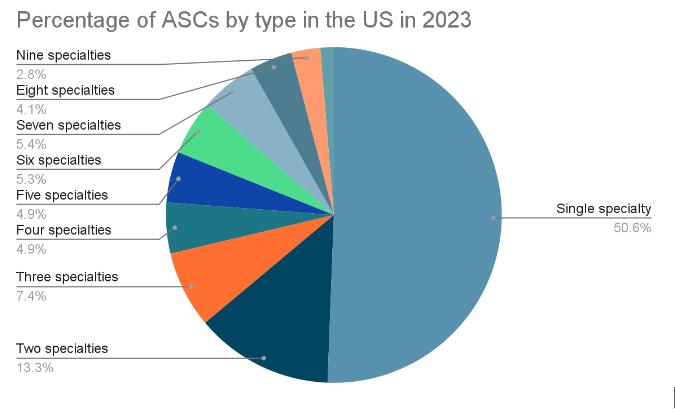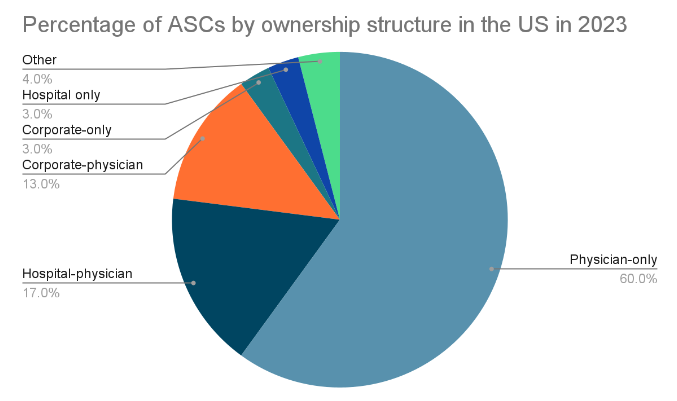Types of Ambulatory Surgery Centers
Ambulatory surgery centers, or ASC in short, are healthcare facilities providing surgical care with same-day patient release. Since they offer large-scale services, there are different types of ambulatory surgery centers.
Ambulatory surgery centers are divided into several categories, spanning from single to multiple-specialty. Additionally, the ASCs are divided by the type of ownership.
Continue reading to find out all the ASC types. We also compiled a list of the advantages and disadvantages of each so you can understand the categorization better.
Types of Ambulatory Surgery Centers: A Short Overview
The typology of ambulatory surgery centers recognizes two main categorizations. The first one is according to the types of procedures provided. The second categorization is by ownership and management structure.
Considering the diversity of the surgical procedures provided by the ambulatory surgery center, there are:
- Single specialty ASCs
- Multi-specialty ASCs
On the other hand, ambulatory surgery centers in the US are divided into several categories by ownership, including:
- Hospital-affiliated ASCs
- Physician-owned ASCs
- Corporate-owned ASCs
- ASCs owned by multiple entities
Now that you know the types of ambulatory surgery centers, we can continue by explaining the differences between them.

Single-Specialty ASC
As the name suggests, single-specialty ASCs provide surgical procedures only in one medical discipline. There are single specialty facilities in almost every clinical area.
The most common single-specialty ASC are:
- Oral and maxillofacial surgery
- Dermatology
- Endoscopy centers
- Gastroenterology
- Neurology
- Ophthalmology practices
- Orthopedic surgery centers
- Pain management centers
- Plastic surgery centers
- Podiatry clinics
- Respiratory centers
Pros of single-specialty ASCs
All types of ambulatory surgery centers have their advantages and disadvantages. So do single-specialty ASCs. We will start by explaining the pros.
The first advantage of single-specialty ASCs is efficiency. Specializing in one field might bring streamlined operational services. Typically, when a medical facility has a high volume of the same procedures, they might maximize the teamwork and do the procedures as a routine.
Next, single-specialty ASCs are usually more cost-effective businesses compared to multi-specialty. The supplies and equipment can be ordered in bulk purchases. Consequently, they have leverage when negotiating with vendors. Therefore, the indirect costs may be reduced.
Another benefit is the accurate management of block times. Since single-specialty ASCs have fewer surgeons, the assignment of medical staff in the operating room may be easier.
Due to the ability to accurately plan block times, the facility might benefit from faster case times and turnovers and lower overhead costs.
Cons of single-specialty ASCs
The first disadvantage of single-specialty ASCs is the higher vulnerability to reimbursement changes. The reimbursement trends are showing a decline. Single-specialty ASCs are especially hit when most of their procedures are dependent on Medicare.
Specializing the healthcare facility in one medical field leaves limited space for expansion in the future. Also, the entire center depends on a small number of physicians and surgeons.
Multi-Specialty ASC
Multiple-specialty ASCs provide broader surgical healthcare services. They can cover two or more medical fields.
Multi-specialty ASCs offer more flexibility and convenience. Patients who need different types of procedures can especially benefit from multi-specialty ASCs.
The most common multi-specialty ASCs in the US specialize in the following medical areas:
- Two specialties
- Orthopedic and pain management centers
- Ophthalmologic and plastic
- Three specialties
- Orthopedic, pain, and podiatry centers
- Orthopedic, pain, and plastic surgery
- Orthopedic, pain, plastic, and podiatric
- Four specialties
- ENT, orthopedic, pain, and podiatric
- ENT, orthopedic, pain, plastic, and podiatric
Pros of multi-specialty ASCs
Multi-specialty ASCs offer more types of ambulatory surgery, meaning the facility may be more profitable. The efficiency and volume of procedures might increase by choosing the right combination of medical areas to serve.
Compared to single-specialty ASCs, the vulnerability of multi-specialty ASCs to technology and reimbursement changes is lower.
As technology improves, medicine can find a way to do a surgical procedure non-surgically. Then, multi-specialty ASCs will take a hit in only one of their sectors. Fortunately, increasing the number of procedures in other sectors can fill the gap without making big changes.
Another advantage of multi-specialty ASCs is enhanced staff recruitment. A multi-specialty ASC needs staff with different backgrounds.
Still, you will have the chance to choose the best of the best. In fact, for some positions like operating room supervisor, it is advised to hire someone with experience in multiple specialties.
Other benefits of multi-specialty ASCs are maximized payer relationships and increased negotiating power.

Cons of multi-specialty ASCs
The primary disadvantage of multi-specialty ASCs is the equipment. First, the medical facility should purchase a variety of equipment and supplies for each sector.
The costs of maintaining the current equipment and keeping up with the latest technology may be costly. In addition, equipment standardization might be hard to handle without expert management.
How to choose the specialties for multi-specialty ASCs?
What some ASC owners prefer to do is go by demand or volume of procedures. That’s why there are a lot of ASCs in the US that offer the most common surgical procedures, including:
- Cataract surgery
- Gallbladder removal
- Tonsillectomy
- Endoscopy
- Colonoscopy
- Arthroscopic procedures
- Orthopedic procedures
Others prefer to open an ASC according to the highest increase in Medicare payments. For 2022, those specialties were cardiology, orthopedics, and urology.
However, our tips for establishing the multi-specialty ASC would be:
- Make an assessment of how many specialties you can handle.
- Find the right combination of compatible specialties.
- Avoid surgical procedures that need general anesthesia because of the longer recovery time.
- Consider the duration of the procedures and make an assessment of how many operating rooms you will need.
- Check and consider the operational and administrative implications of the specialties.
- Research the reimbursement for the specialties you plan to have.
Single-Specialty vs. Multi-Specialty ASCs
Here is a side-by-side comparison of single and multiple-specialty ASCs.
| Single-specialty ASC |
Multiple-specialty ASC |
| Lower overhead | Higher overhead |
| Streamlined equipment purchasing | More diverse equipment and supplies are needed |
| Vulnerable to reimbursement changes | Less vulnerable to reimbursement changes |
| Less-likely to be expanded | More likely to expand and change the operating structure |
Hospital-Affiliated ASCs
A hospital-affiliated or hospital-based ASC is a special center within the hospital. They are owned and operated by the hospital.
Pros of hospital-affiliated ASCs
If the hospital has an ambulatory surgery center, there is no need to find third-party equities to do the procedures. The reduced reliability to third-party equities might potentially increase the efficiency of the medical staff.
One of the most important advantages of these types of ambulatory survey centers is that patients can get the proper care in one place. The hospital-affiliated ASCs prevent patients from going outside the health system for their surgical procedures.
Another advantage hospitals can use is transforming their hospital-based outpatient department into ASCs. When the hospital transforms the outpatient department to an ASC, it reduces the Medicare pre-payment procedures. This allows commercially insured individuals to save money on surgical procedures.
Ultimately, when hospitals open a hospital-affiliated ASC, they are following consumer-driven trends. This allows them to grow.
Cons of hospital-affiliated ASCs
The biggest con of hospital-affiliated ASCs is the difficulty of keeping physicians to work for an ASC solely owned and operated by the hospital. Therefore, there is a small share of solely hospital-affiliated ASCs, and each year that number is declining.
Typically, hospital systems partner with physicians and share ownership. In fact, 80% of hospitals own one or more ASCs together with physicians. However, there are two main disadvantages of hospital-physician joint ventures.
The first one is the possibility of conflicts of interest. The other is that the facility might face issues with the management style and ownership.
Physician-Owned ASCs
Physician-owned ASCs are types of healthcare facilities that are owned by one physician or a group of physicians. They provide same-day surgical care. The owner of the facility is obligated to perform at least one-third of the operations in their ASC.
According to the types of ambulatory surgery centers, the physician-owned can be:
- Single-specialty
- Multi-specialty
- Single-group
- Multigroup
Physician-owned ASCs are allowed to have an investor, but they must ensure fair market value pay according to their share in the facility.
Pros of physician-owned ASCs
First and foremost, physician-owned ASCs offer better accountability. The physician who owns the facility has control over the quality and clinical environment in the facility.
Typically, a physician-owned ASC dedicates its time to the patients. Patients don’t need to go through hospital administration to share their concerns with the physicians.
Lastly, physician-owned ASCs are highly specialized but offer more flexibility than hospitals. The physician-owned ASC has greater control over the scheduling of surgical procedures.
Cons of physician-owned ASCs
Two out of the three cons of physician-owned ASCs are regarding the staff. In reality, many physician-owned ASCs are having trouble finding qualified staff, including physicians and nurses.
Consequently, with staff shortage, the staff that is already employed in a physician-owned ASC is overworked. With employee burnout, the quality of the services may suffer.
The third challenge of physician-owned ASCs is that they often have operating room inefficiencies.

Corporate-Owned ASCs
Corporate or business-owned ASCs are typically chosen when one business owns and manages multiple ASCs. The physicians employed in the corporate-owned ASC typically become partners.
Larger corporations and management companies are the most common owners of corporate-owned ASCs. Regarding the field they are working in, they offer diversified healthcare services. More often than not, corporate-owned ASCs are spread around different locations.
Pros of corporate-owned ASCs
Financially looking, some of the corporate-owned ASCs have more money at their disposal. Therefore, they can invest in the best equipment. Patients may benefit from these investments and receive better care.
The previous experience of the business owners is a huge advantage for the ambulatory surgery center. Some of the qualities that business owners and management might offer are:
- excellent negotiating power
- practice for making more efficient operational strategies
- knowing how to leverage economies of scale
Cons of corporate-owned ASCs
Although it is not necessarily the case, corporate-owned ASCs might be profit-driven and sacrifice patient care for financial benefits. When a business runs an ambulatory surgery center, there might be budget cuts that can lead to quality compromisation.
If the corporate-owned ASC has facilities in multiple locations, they might lack time to connect with the local community. Without a proper strategy in place, potential patients might not trust corporate-owned ASCs.
ASCs Owned by Multiple Entities
Ambulatory surgical centers owned by multiple entities are getting highly popular in the US. There are several types of ASCs owned by multiple entities, including:
- Joint venture between physicians and an ASC management company
- Joint venture between physicians and a hospital system
- Joint venture between physicians, a hospital system, and an ASC management company
Pros of ASCs owned by multiple entities
The ASC can function more effectively because all stakeholders have expertise in different fields. Physicians are typically responsible for improving the quality of care.
ASC management companies offer their expertise in contracting, executions, revenue cycle management, and other operational issues. Lastly, hospital systems are typically the ones that offer financial stability.
Cons of ASCs owned by multiple entities
The most common disadvantages of this type of ASC are:
- Conflicting interests and communication difficulties
- Complex governance structure, making the decision-making process harder
- Financial conflicts about the share of capital investment of each owner
How Many Ambulatory Surgery Centers Are There in The US?
As of June 2023, there were 11,255 ambulatory surgery center businesses in the United States. The healthcare sector reported a 2.1% year-over-year growth compared to the numbers from 2022.
But what is the share of each type of ambulatory surgery center?
ASCs by type
According to the ASC Data report, 50.6% of ASCs in the US were single-specialty facilities. Endoscopy and ophthalmology are the top specialties of single-specialty ASC, counting 36.7% and 35.5%, respectively.
The remaining 49.4% were multi-specialty ASCs. The main medical field combination they operate in is orthopedics and pain management. They represent 17% of the total number of multi-specialty ASCs.

ASCs by ownership structure
The most common type of ambulatory surgery center in the US by ownership structure is physician-only, which is 60% of all the registered ASCs. Next come hospital-physician and corporate-physician with a 17% and 13% share, respectively.

Conclusion
So there you have it – all types of ambulatory surgery centers explained in one place. Comparing the advantages and challenges of every ASC type can help you make an informed decision.
If you have any doubts about the type of ambulatory surgery center that will work for you, feel free to reach out to Surgery Center Consultants. We are one of the best consulting services in the US. With our 45 years of experience, we can help you build your ideal ASC.





